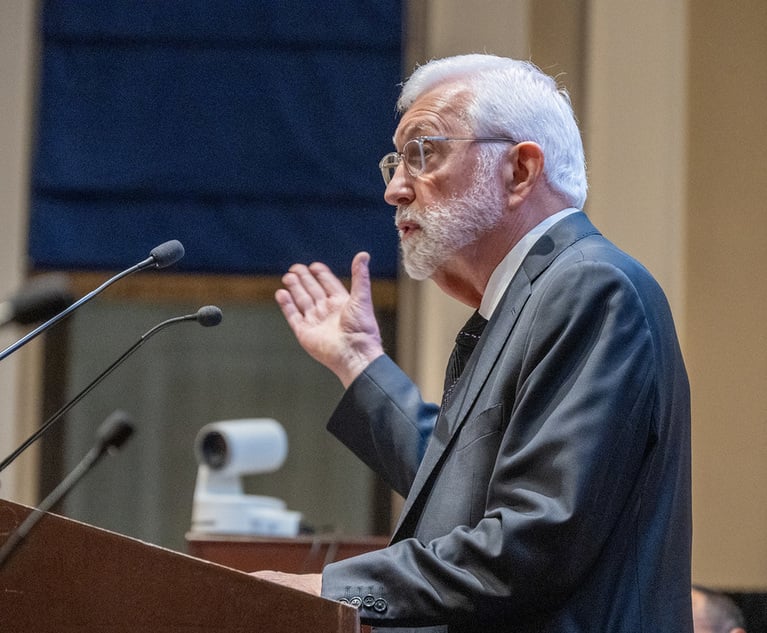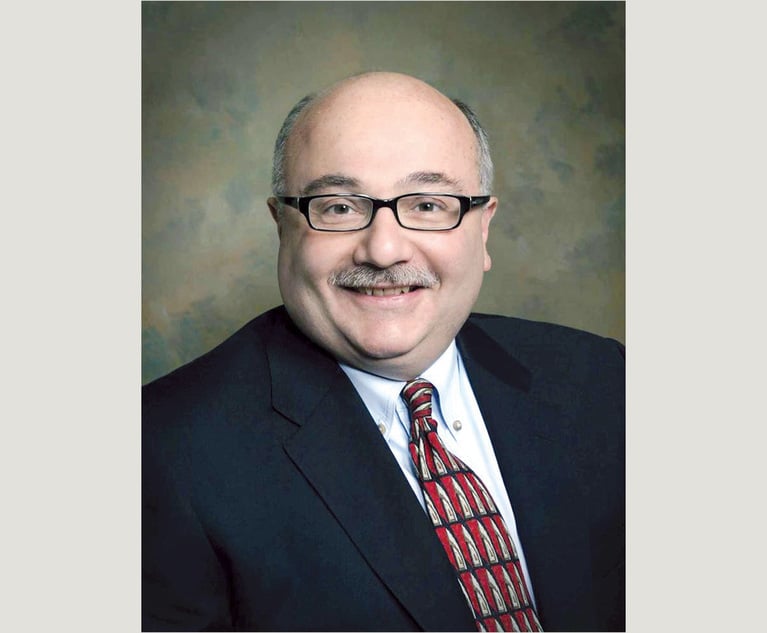 Harvey Weinstein arrives at the First Precinct in lower Manhattan, May 25, 2018. Photo: David Handschuh/NYLJ)
Harvey Weinstein arrives at the First Precinct in lower Manhattan, May 25, 2018. Photo: David Handschuh/NYLJ) Manhattan DA Says Evidence Is Strong on Remaining Charges Against Harvey Weinstein
The Manhattan DA's filing is a response to Weinstein's latest motion to dismiss, in which Weinstein argues that alleged police misconduct has tainted the grand jury proceedings in the case.
November 19, 2018 at 03:26 PM
4 minute read
Fighting to maintain its sexual assault case against former movie producer Harvey Weinstein, the Manhattan District Attorney's office argues in papers filed on Monday that while one of six counts against fallen Hollywood titan has been dismissed, the evidence supporting the remaining counts is strong.
The Manhattan DA's filing is a response to Weinstein's latest motion to dismiss, in which Weinstein argues that alleged police misconduct has tainted the grand jury proceedings in the case. Weinstein still faces two counts of predatory sexual assault, which carries a maximum penalty of life in prison.
Last month, the Manhattan DA's office moved to dismiss one count of first-degree criminal sexual act when it was revealed that New York City Police Det. Nicholas DiGaudio, who led the investigation against Weinstein, did not tell prosecutors that a witness had provided him with an account that contradicted that of Lucia Evans, who claimed that Weinstein forced her to give him oral sex in 2004.
The dismissal of the criminal sexual act charge removed Evans as one of the accusers in the criminal case against Weinstein, leaving Mimi Haleyi, a production assistant who says the producer forced himself on her in 2006 and an accuser who is unnamed in court filings who says that Weinstein assaulted her in 2013.
Prosecutors later disclosed that DiGaudio told the 2013 accuser to delete files from cellphones that she was handing over as evidence in the case.
Weinstein argues that prosecutors should have presented grand jurors with communiques between Weinstein and the unnamed accuser from after the alleged assault that he says shows that the two had a consensual romantic relationship. He also says that, because the testimony undergirding the dismissed count was allegedly based on false testimony, that the whole case should get thrown out.
In response, Assistant District Attorney Kevin Wilson argued in court filings that the disclosures about alleged misconduct by DiGaudio do not show that the testimony supporting the criminal sexual act count was false and that it had no bearing on the strength of the remaining five counts.
Wilson said his office is not required to show exculpatory evidence to the grand jury, citing a 1986 ruling by the Court of Appeals in which the court said that a defendant can present exculpatory evidence to a grand jury through his or her own testimony.
Weinstein did not testify before the grand jury in the case, saying he was not given adequate notice to prepare for testimony.
With respect to a request from Weinstein for a hearing on issues raised in his motion to dismiss, Wilson said that Weinstein wants a hearing to put on a “public circus that will further the public relations campaign the defendant has been waging from the outset of this case.”
In response to the new filing from the prosecution, Benjamin Brafman of Brafman & Associates, lead counsel for Weinstein, said nothing in the new filing gives him additional confidence in the integrity of the grand jury proceedings.
“As for the hearing that the People fear will become a 'circus,' it is a circus that they created with the DA and the NYPD calling each other liars,” Brafman said.
Read more:
This content has been archived. It is available through our partners, LexisNexis® and Bloomberg Law.
To view this content, please continue to their sites.
Not a Lexis Subscriber?
Subscribe Now
Not a Bloomberg Law Subscriber?
Subscribe Now
NOT FOR REPRINT
© 2024 ALM Global, LLC, All Rights Reserved. Request academic re-use from www.copyright.com. All other uses, submit a request to [email protected]. For more information visit Asset & Logo Licensing.
You Might Like
View All

Decision of the Day: Second Amendment Does Not Offer Right to Obtain Firearms 'On Demand'

Decision of the Day: Firm, Founding Partner Disqualified From Probate Case Amid Investigation on Undue Influence Claim

Decision of the Day: District Judge Vacates Magistrate's Ruling to Disqualify Prosecutors in Kidnapping Case
Trending Stories
- 1Call for Nominations: Elite Trial Lawyers 2025
- 2Senate Judiciary Dems Release Report on Supreme Court Ethics
- 3Senate Confirms Last 2 of Biden's California Judicial Nominees
- 4Morrison & Foerster Doles Out Year-End and Special Bonuses, Raises Base Compensation for Associates
- 5Tom Girardi to Surrender to Federal Authorities on Jan. 7
Who Got The Work
Michael G. Bongiorno, Andrew Scott Dulberg and Elizabeth E. Driscoll from Wilmer Cutler Pickering Hale and Dorr have stepped in to represent Symbotic Inc., an A.I.-enabled technology platform that focuses on increasing supply chain efficiency, and other defendants in a pending shareholder derivative lawsuit. The case, filed Oct. 2 in Massachusetts District Court by the Brown Law Firm on behalf of Stephen Austen, accuses certain officers and directors of misleading investors in regard to Symbotic's potential for margin growth by failing to disclose that the company was not equipped to timely deploy its systems or manage expenses through project delays. The case, assigned to U.S. District Judge Nathaniel M. Gorton, is 1:24-cv-12522, Austen v. Cohen et al.
Who Got The Work
Edmund Polubinski and Marie Killmond of Davis Polk & Wardwell have entered appearances for data platform software development company MongoDB and other defendants in a pending shareholder derivative lawsuit. The action, filed Oct. 7 in New York Southern District Court by the Brown Law Firm, accuses the company's directors and/or officers of falsely expressing confidence in the company’s restructuring of its sales incentive plan and downplaying the severity of decreases in its upfront commitments. The case is 1:24-cv-07594, Roy v. Ittycheria et al.
Who Got The Work
Amy O. Bruchs and Kurt F. Ellison of Michael Best & Friedrich have entered appearances for Epic Systems Corp. in a pending employment discrimination lawsuit. The suit was filed Sept. 7 in Wisconsin Western District Court by Levine Eisberner LLC and Siri & Glimstad on behalf of a project manager who claims that he was wrongfully terminated after applying for a religious exemption to the defendant's COVID-19 vaccine mandate. The case, assigned to U.S. Magistrate Judge Anita Marie Boor, is 3:24-cv-00630, Secker, Nathan v. Epic Systems Corporation.
Who Got The Work
David X. Sullivan, Thomas J. Finn and Gregory A. Hall from McCarter & English have entered appearances for Sunrun Installation Services in a pending civil rights lawsuit. The complaint was filed Sept. 4 in Connecticut District Court by attorney Robert M. Berke on behalf of former employee George Edward Steins, who was arrested and charged with employing an unregistered home improvement salesperson. The complaint alleges that had Sunrun informed the Connecticut Department of Consumer Protection that the plaintiff's employment had ended in 2017 and that he no longer held Sunrun's home improvement contractor license, he would not have been hit with charges, which were dismissed in May 2024. The case, assigned to U.S. District Judge Jeffrey A. Meyer, is 3:24-cv-01423, Steins v. Sunrun, Inc. et al.
Who Got The Work
Greenberg Traurig shareholder Joshua L. Raskin has entered an appearance for boohoo.com UK Ltd. in a pending patent infringement lawsuit. The suit, filed Sept. 3 in Texas Eastern District Court by Rozier Hardt McDonough on behalf of Alto Dynamics, asserts five patents related to an online shopping platform. The case, assigned to U.S. District Judge Rodney Gilstrap, is 2:24-cv-00719, Alto Dynamics, LLC v. boohoo.com UK Limited.
Featured Firms
Law Offices of Gary Martin Hays & Associates, P.C.
(470) 294-1674
Law Offices of Mark E. Salomone
(857) 444-6468
Smith & Hassler
(713) 739-1250






